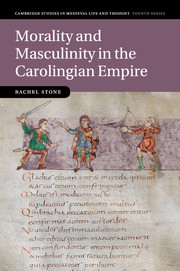Book contents
- Frontmatter
- Contents
- Illustrations
- Acknowledgements
- A note on translation
- Abbreviations
- The Carolingian empire
- Genealogy of Carolingian rulers
- Chapter 1 Introduction
- Chapter 2 Moral texts and lay audiences
- Chapter 3 Warfare
- Chapter 4 Imagining power
- Chapter 5 Central power
- Chapter 6 Personal power
- Chapter 7 Power and wealth
- Chapter 8 Marriage
- Chapter 9 Sex
- Chapter 10 Men and morality
- Bibliography
- Index
Chapter 8 - Marriage
Published online by Cambridge University Press: 05 November 2011
- Frontmatter
- Contents
- Illustrations
- Acknowledgements
- A note on translation
- Abbreviations
- The Carolingian empire
- Genealogy of Carolingian rulers
- Chapter 1 Introduction
- Chapter 2 Moral texts and lay audiences
- Chapter 3 Warfare
- Chapter 4 Imagining power
- Chapter 5 Central power
- Chapter 6 Personal power
- Chapter 7 Power and wealth
- Chapter 8 Marriage
- Chapter 9 Sex
- Chapter 10 Men and morality
- Bibliography
- Index
Summary
As already indicated, marriage, alongside warfare, was one of the key markers defining lay status in the Carolingian period, while both clerics and monks were expected to abstain from all sexual activity. The marital and sexual norms for the laity were therefore distinctive, but lay behaviour was not solely a ‘private’ matter to be decided within the patriarchal familia. The key social role of marriage throughout western history meant that rulers recurrently legislated on the topic and on related sexual issues, while the church’s interest in marriage and sexuality developed from an early date. The first Frankish synods under Carolingian control, in the 740s and 750s, were already concerned to regulate these key aspects of lay life. In this chapter the Carolingian norms on marriage will be analysed, while Chapter 9 deals with sexual behaviour both inside and outside marriage. Although there is some overlap between the two topics, especially in the wide-ranging concept of ‘incest’ (discussed below), such a separation can help clarify the reformers’ priorities.
Christianity had developed an understanding of marriage unknown both to Judaism and the classical world, in which marriage was seen as possessing a sacramental character. St Paul and his followers, attempting to preserve the institution of the pious Jewish household in new Christian communities, developed an ideology of the loving, but hierarchical marriage. The debate in the fourth-century West over clerical celibacy demonstrates the varied views of patristic writers, ranging from Jerome’s denigration of married people to Augustine’s development of a substantial theology of marriage. Bitter conflicts between late antique churchmen over claims to authority within Christian society thus lay behind patristic texts. Subsequently removed from their political context, such texts were to be the raw material for many Carolingian discussions of marriage and sex. As Jean Gaudemet has pointed out, the vocabulary of marriage inherited from the fourth and fifth century (terms such as desponsatio, used for an intermediate stage in the process of marriage, and matrimonium) was also vague.
- Type
- Chapter
- Information
- Morality and Masculinity in the Carolingian Empire , pp. 247 - 278Publisher: Cambridge University PressPrint publication year: 2011

